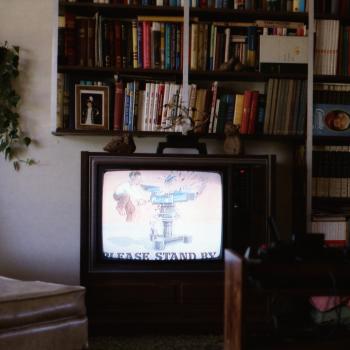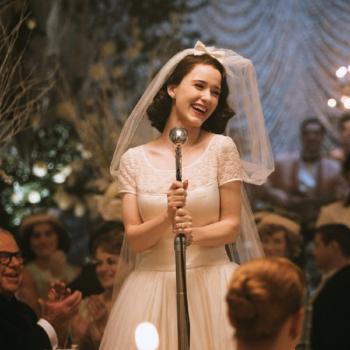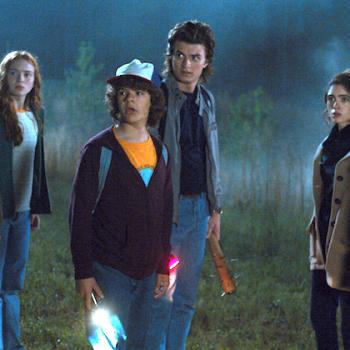 It’s good to see the return of writer/director Whit Stillman. I missed his refreshing take on the world, peopled with earnest, decent, often forlorn characters who parody the culture by way of urbane, stylized discussions. In Damsels in Distress, Stillman again features the upper classes, those most maligned by the yawn-inducing “independent” film establishment that applauds its own supposed bravery by shooting ancient fish in an ancient barrel.
It’s good to see the return of writer/director Whit Stillman. I missed his refreshing take on the world, peopled with earnest, decent, often forlorn characters who parody the culture by way of urbane, stylized discussions. In Damsels in Distress, Stillman again features the upper classes, those most maligned by the yawn-inducing “independent” film establishment that applauds its own supposed bravery by shooting ancient fish in an ancient barrel.
When he broke onto the scene in 1990 with Metropolitan, a tribute to debutante after-parties, Stillman won my devotion with characters lamenting the plot of Buñuel’s over-hyped film The Discreet Charm of the Bourgeoisie: “When I first heard the title,” says Charlie, “I thought: ‘Finally someone’s gonna tell the truth about the bourgeoisie!’ What a disappointment. It would be hard to imagine a less fair or accurate portrait…The truth is, the bourgeoisie does have a lot of charm.”
Of course it does; people are people, even if they do dress better and live in nicer houses than we do. Stillman is the champion of those seldom championed.
Damsels is the director’s first film since 1998’s The Last Days of Disco, and it quiets fears that too much time has passed since his last outing. Like many of his heroines, Violet (played perfectly by Greta Gerwig) is the Austenish leader of a group of sweater-over-sundress co-eds with floral names (Rose and Heather) who set out to re-civilize an east coast liberal arts school. The place has gone downhill ever since they admitted boys, and some of the girls suffer nasal-shock syndrome from dorm-emitted fumes.
When Lily (Annaleigh Tipton), a transfer student, attracts the group’s notice, she’s initiated into Violet’s projects for cultural reclamation.
Violet’s main focus is the Suicide Prevention Center. Too many students have killed themselves of late (a gallows reference to a real phenomenon) and her group runs the place with sympathy, donuts, and sage advice about hygiene.
Cleanliness, says Violet, is a way out of depression. After a good hot shower with some nice-smelling soap, negative outlooks tend to change. However, not all those at-risk seem open to this approach; some are even hostile.
“You’re just afraid I’ll commit suicide and make you look bad,” says one girl, accusingly.
“I’m afraid you’ll commit suicide and make yourself look bad,” says Violet, gently.
Though comically conveyed, lines like these speak to something we kind of suspect. For example, Violet won’t use the term “depression.” She prefers “tailspin.” It’s a cliché, yes, but Violet points out that clichés are a storehouse of wisdom. They succinctly state what eons of people have found to be true; hence, their usefulness.
Violet is also optimistic about tap-dancing as a highly effective therapy to cure the blues. One of her aspirations, in fact, is to set off a national dance craze. Everyone can participate in such things. They enliven and bond the participants, a means by which social cohesion is formed, cemented, and enjoyed in one fell swoop. To that end, she’s choreographed the “Sambolla” and hopes to premier it at the nearby student center.
This kind of behavior is targeted as dangerous by the editor of the school newspaper—The Daily Complainer—and by a French playboy (and closet member of the sub-rosa Cathar religion—the Manichean heretics wiped out in the Middle Ages) who has his eye on Lily. Violet’s group, along with the school’s “Roman Letter Societies,” must be eradicated, says the intellectual in-crowd.
Of course, Violet defends the Roman Letter societies: they provide housing for boys who don’t have a lot of potential. In fact, their all-around unlikeliness gives the lie to these fellows’ supposed elitism. Why would a supposedly Christian world want to throw them out in the street? (It’s hilarious how Violet assumes Christianity in others, and how others recoil from the word in horror).
As good as she preaches, Violet’s own boyfriend, Frank, is a dimwit. Too much anxiety comes from the standard dating scene, she believes, where everybody tries to date someone cooler than himself.
“Date down,” she counsels Lily. Help someone up in the process. She also smiles upon customary dating practices, and finds drink-buying to be a courtship ritual of the first order, earnest and generous in nature: “Drinks are expensive.”
Lily and Violet have interesting exchanges, the kind of talk that’s fair to both sides. Violet, outed as something of a doofus by Lily, admits that her peculiarities do give her certain doofus-like tendencies—but those who are cool wind up losing part of their humanity in the quest for coolness, inhuman insofar as they are cool. Lily ponders this.
In turn, Lily says that there’s too much propaganda for “uniqueness,” when the truth is that the unique are often a real pain in the neck. The world needs to be peopled by the normal, argues Lily, and she wants to be one of them. Violet ponders this as well.
I think that most of the audience I saw the film with truly despised Violet. You could hear it in the whispered comments—anxious for her come-uppance and glad when she suffered a setback—or “tailspin,” as she would have it. They were like so many of the critics who at first warmed to Stillman, then soured on him when they suspected where his sympathies lay. The word “twee” became their way of dismissing him. Talk about elitists.
Well, to hell with ‘em all, I say. Violet is great—as is Audrey in Metropolitan, the girl who champions Fanny Price from Mansfield Park against the neo-socialist boy who she has a crush on—as are Ted and Fred in Barcelona, who teach Spanish girls the wonders of the good ole American hamburger—as is Alice in The Last Days of Disco, who maneuvers her way through a world decaying around her, though alight with multi-mirrored balls.
We owe them a lot, this discreet crowd. They’re really quite charming.
A.G. Harmon teaches Shakespeare, Law and Literature, Jurisprudence, and Writing at The Catholic University of America in Washington, D.C. His novel, A House All Stilled, won the 2001 Peter Taylor Prize for the Novel.












